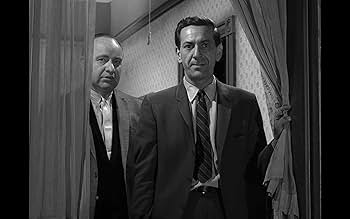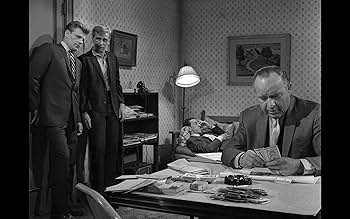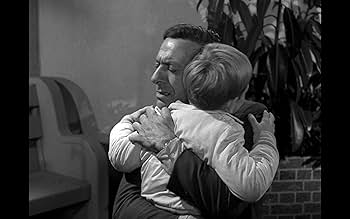In Praise of Pip
- Episode aired Sep 27, 1963
- TV-PG
- 25m
Wearied bookie Max Phillips, learning of his grown soldier son Pip getting wounded during combat in South Vietnam, gets to spend one last delightful hour with a ten-year-old version of Pip a... Read allWearied bookie Max Phillips, learning of his grown soldier son Pip getting wounded during combat in South Vietnam, gets to spend one last delightful hour with a ten-year-old version of Pip at an amusement park after dark.Wearied bookie Max Phillips, learning of his grown soldier son Pip getting wounded during combat in South Vietnam, gets to spend one last delightful hour with a ten-year-old version of Pip at an amusement park after dark.
- Pvt. Pip
- (as Robert Diamond)
- Doctor
- (uncredited)
- Lieutenant
- (uncredited)
- George Reynold
- (uncredited)
- Moran
- (uncredited)
- Gunman
- (uncredited)
- Surgeon
- (uncredited)
- Narrator
- (uncredited)
- …
Featured reviews
Bookie Max Phillips, who has essentially sacrificed his life to booze and to being a shill for a sleazy boss, takes pity on one of his clients, a young man who has embezzled the money to bet on a nag recommended by Max. At the same time his boss confronts him, Max learns his son is dying in Vietnam, and decides to take a stand. His actions give him an hour with his son as a 10-year old boy in a nearby amusement park -- the best memories of his life. Max's self-awareness of how he has screwed up this relationship makes the moments in the amusement park poignant without being cloying, and the finale makes its point gently, noting that we remember those who taught us by the small lessons, rather than the grand plans.
Serling's teleplay -- one of his last great ones -- is as good as anything he had written for the series. It is clear he knows Max Phillips, and that he's less interested in making a grand political point than in telling a story about a man's love for his child, and the awareness that we sometimes sacrifice the importance of these relationships for our own petty wants and needs. Likewise, Joseph Newman's direction and the cinematography shifts from the spare, desolate shooting of Max's roominghouse and his boss' lair, to the warm light bathing his son (Billy Mumy) and the amusement park, beautifully realizing what each of these means to Max. Newman also wonderfully cites Orson Welles' "The Lady from Shanghai" and an elegantly spooky final shot of Max.
Above all, however, is Klugman's superb performance. He is utterly believable as the jaded bookie, and equally believable as the father desperate for reconciliation with his son. He was clearly one of the favorite actors on "The Twilight Zone", delivering four great lead performances (only Burgess Meredith would provide as many). "In Praise of Pip" shows why Serling and the shows producers held him in such regard.
First, Klugman is a tour de force as the aging bookie, weighed down by a lifetime of bad decisions, who gets and takes his last shot at redemption. No one could play this kind of character as well as him as he - along with Burgess Meredith - crystalizes his legacy here, effectively as one of the TZ's actors in residency. He is so powerful, yet vulnerable, an absolute master of his craft working some Sterling's best, most poignant writing.
The second story line speaks to, what might be seen as Mr. Serlings' foresightedness. The release date was 27 September 1963. JFK had a little less than two months to live. The American public knew, and cared very little at that point in time about our nation's latest proxy war with communist forces and ideology ... the "conflict" in Vietnam. Kennedy, by his own admission was ambivalent about his intentions for the conflict with many, to this day, claiming that, had he lived, he would have withdrawn after the 64 election. We were still in the phase of sending "advisors" there, not actual combat troops. By years end, we would have over 16,000 advisors there with a little less than 200 total deaths since the beginning of our involvement. The first actual combat troops would arrive in March of 1965 under LBJ. At peak, by 1968, we would have over 550,000 troops deployed and by wars end, in 1975, over 58,000 American deaths. Estimates of "enemy" deaths range from 1 to 3 million people.
What is initially remarkable here is that it was one televisions earliest mentions of Vietnam, if not the very first. References to Vietnam anywhere, other than on the news were so rare and actually jarring to see and hear, even later on in the war and especially on entertainment TV. I know that on Route 66, one of the lead characters was called out as a Vietnam vet and, perversely, on the Munsters, when Herman was being given a baseball tryout, Manager, Leo Durocher, so awed by Herman's strength power, exclaimed that he didn't "know whether to sign him with the Dodgers or send him to Vietnam". To this day, given the polarizing tendencies of Vietnam, those sorts of references can actually be disturbing or at least disquieting.
Klugman's exasperated line: "There isn't even supposed to be a war going on there" might not have carried a lot of weight during the first broadcast in 1963, but given what Vietnam would become in less than two years and the fact that the overwhelming number of episode views would come later in syndicated reruns, that line would come to have both agonizing and ironic gravitas.
Did you know
- TriviaThe script originally had Pip stationed in Laos, but the network had Rod Serling change it to Vietnam. Incredibly, CBS didn't want it set in Laos, as that country was at the time the scene of intense fighting and insisted the story be set in the more peaceful location of South Vietnam. This episode was produced about two years before the massive intervention of American forces in South Vietnam.
- GoofsIn the beginning when Max opens the whiskey bottle. He throws the cap away. In the next scene he is screwing the cap onto the bottle and tosses the bottle into a drawer.
- Quotes
Narrator: [Closing Narration] Very little comment here, save for this small aside: that the ties of flesh are deep and strong, that the capacity to love is a vital, rich and all-consuming function of the human animal, and that you can find nobility and sacrifice and love wherever you may seek it out: down the block, in the heart, or in the Twilight Zone.
- ConnectionsFeatured in Not Fade Away (2012)
Details
- Runtime
- 25m
- Color
- Aspect ratio
- 1.33 : 1
























